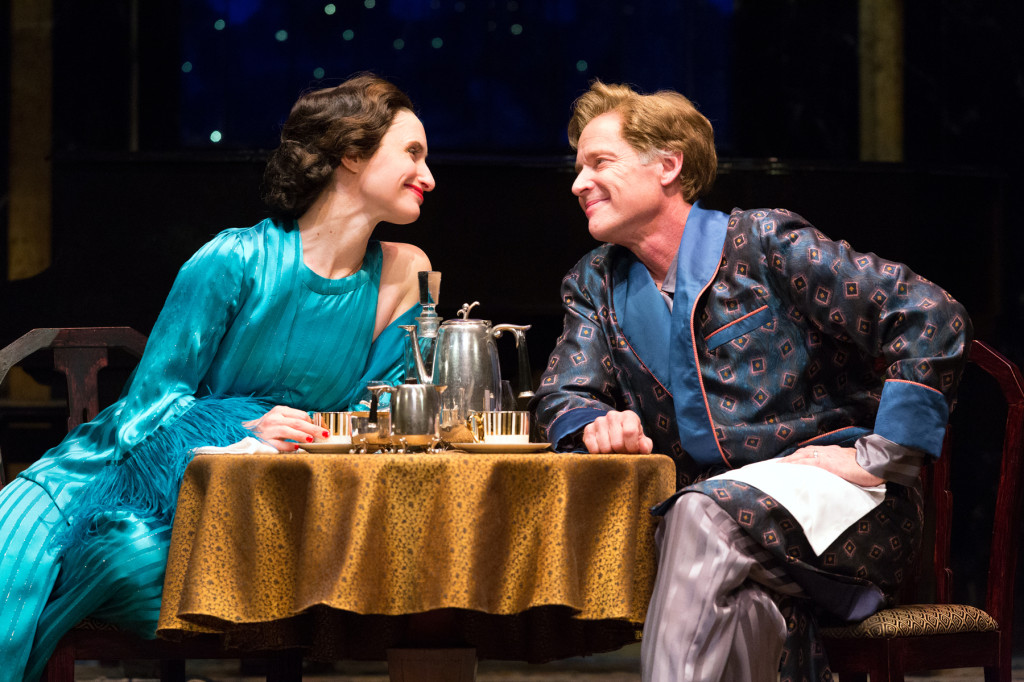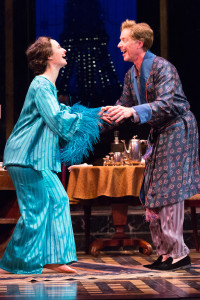
I’ve been over and over the press materials for Walnut Street Theatre’s production of PRIVATE LIVES and damned if I can find any statement from its director, Bob Carlton. I guess that’s not necessarily unusual but…nothing? No director’s note? No “I’m really jazzed to be directing blah blah blah?” Even in the program, all we get is a brief, “We’re delighted that you’ve joined us” blurb from WST’s artistic director, Bernard Havard, which is itself heavily plagiarized from the press release. Maybe I’m old-fashioned, but I figure even a stodgy old workhorse like Noël Coward warrants a statement of purpose from his directors. Is this no longer fashionable?
I ask because I suspect that Carlton hates Coward’s play, and that he is determined to set the defenseless dead man sprinting for the open bar that I sincerely hope is included in the afterlife.
There’s a lot going wrong in Carlton’s production of PRIVATE LIVES, and in fairness, not all of it is his fault. For one thing, unless there is some vast Pynchonian conspiracy going on that I’ve yet to uncover, I’m sure that Carlton cannot control the weather. As such, it remains what people at the office refer to as “cold season”; and, as such, the Act I audience for the opening of PRIVATE LIVES was about the coughingest audience I’ve ever been stuck in. Poor Sibyl and Elyot (Lauren Sowa and Greg Wood) could hardly get a word in edgewise. I doubt that David Mamet, when he wrote his well-intentioned essay “Against Amplification,” had imagined the difficulty of communicating Coward’s expository banter to a thousand-seat theater full of consumptive cigarette smokers.
An especially attentive auditor might have gathered that Sibyl and Elyot are honeymooning newlyweds, and though Elyot is five years divorced, his beloved cannot help but inject the subject of his ex-wife Amanda into their conversation. Hilarity ensues when, whaddya know, Amanda (Kathleen Wallace) and her new husband, Victor (Dan Hodge) are honeymooning in the same French seaside resort! In the next room! With an adjoining balcony for some reason! Far be it for me to question early 20th century French architecture, but I think even the dead Englishman who wrote this play would agree that, in 2015, this would be hard to buy even as a sitcom plot.

That’s just fine by Carlton, however, who, judging by his approach to Coward’s text, is a sucker for braindead American sitcoms. Faced with this droll comedy of manners, Carlton cannot resist the urge to fatten his production with physical comedy, heaped on by the shovelful and at the most inappropriate moments. For instance, after Elyot and Amanda—their love renewed by the chance encounter—run away to Amanda’s Parisian flat, there is a scene where they dance over light conversation. Coward’s stage direction is, “they dance.” There’s dialogue over the dance, so you’re thinking something like a simple box waltz, right? Nothing crazy, right? But Carlton, in a moment of bizarre tastelessness (though far from the only one in his production), has his poor actors jump around the stage like chimpanzees doing what looks like a free-jazz take on the safety dance. The audience laughs because the actors look like perfect idiots, but what’s the point? We can’t possibly listen to the lines as the playwright intended. It isn’t hard to imagine the director, bored with the dialogue in this scene, striking his actors with a yardstick and shouting, “Do something funny!”
It is the cheapest, most asinine way of manufacturing laughs, and Carlton engages in this behavior not only shamelessly but repeatedly. A scene designed by Coward as an awkward breakfast between the four would-be lovers lapses into aimless absurdity when Carlton has Wood sit on the floor and perform an exhausting series of bits with his food. He drinks half & half, slurps coffee from a plate, and shoves rolls into his mouth like a rabid animal. Unlike in the aforementioned dance scene, Carlton pauses the dialogue for this business so that a one-page scene takes roughly a million years. It’s not Coward, and it’s not funny; it’s just exhausting.
PRIVATE LIVES, as written by Coward, is funny because it exposes the savagery that exists beneath the polished façade of the English upper class. It heightens that distinction by building scenes of witty-but-polite banter only to have the characters launch, at the slightest hint of flippancy, into nasty, bickering, sometimes physical battles. My assumption is that Carlton’s interpretation is meant to further Coward’s metaphor by saddling even the play’s sane moments with insanity. This doesn’t work for two reasons. The first and more obvious is that the play doesn’t need it; PRIVATE LIVES has been getting on just fine for almost a century without the aide of unnecessary physical comedy. The second reason is that it just isn’t funny. Coward’s characters are sophisticates who reveal themselves to be beasts, which creates a comical duality; Carlton’s actors begin as clowns and proceed as clowns, and their clowning is insufferable. Coward might have mocked the upper class, but Carlton mocks Coward, and as a result we never become invested in the action. [825 Walnut Street] January 13–March 1, 2015; walnutstreettheatre.org.

Love you, Michael, because I completely disagree with everything you say here.
I agree. These actors are murdering the play. I’m in the third act right now. There’s about 2 rows of people asleep
Wait, Jocelyn, all opinions are of course valid, so I don’t want to squash your thought, here, but why are you texting/commenting on your phone while the show is happening in front of your face?
You are suppose to turn your phone off, no? The glare from the screen on your phone is possibly distracting to the actors like Dan Hodge who is, in my opinion, killing it as Victor. Hodge is spot-on impeccable. You should put your phone down and watch him.
Also. if you typed that comment above here, during the third act. You probably missed Clare O’Malley’s entrance as Amanda’s French maid, Louise, and that is a shame. She is outstanding.
As for the people asleep in the first few rows?
So what? You could say the same exact statement about any theater in this city onany given night. The Blue-hair (elderly) crowd is a good portion of the subscriber base of the Walnut, as well as any theater company in the city. Subscribers doze off during Thursday night performances, they open candy, they have issues with hearing aides. This is typical theater-going behavior, and it does not necessarily have anything to do with the performances of the individual actors.
Love arguing with both of you guys. This was fun. Seriously. Thank you!